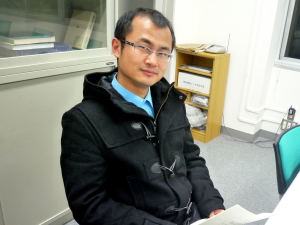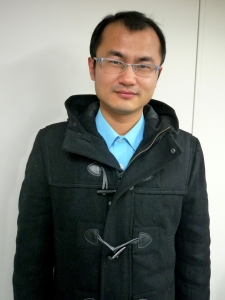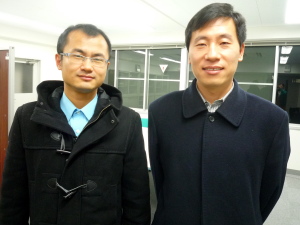Faculty Interview 34
Zhu Yi
(Natinonal Institute for Advanced Humanistic Studies, Fudan University / Associate Professor)

―― Could you tell me what you are studying?
My major is the Chinese history, mainly from the 7th to 13th century. I became interested in the Chinese history when I was a high school student, so I majored it after I was admitted to Peking University (Beijing University) as an undergraduate student. After receiving the Master’s degree at Peking University, I went to the National University of Singapore to pursuing the PhD Degree. The title of my PhD dissertation is “The Evolution of Propitious Rituals in Tang and Song China.”
―― What is the “Propitious Rituals”?
In ancient China there were five categories of state rituals, namely the propitious rituals, the omen rituals, the rituals of guests, the military rituals, and the felicity rituals. The propitious rituals, which were composed of the various sacrifices, were the most important among the state rituals. The sacrifices of imperial ancestral temple, on which I gave a presentation today, were the second most significant propitious rituals, next to the suburban sacrifices.

―― You told us that the sacrifices of imperial ancestral temple from the Tang to Song Dynasty had strengthened their private character rather than their public one. Could you explain to me more easily about the definition of ‘public side’ and ‘private side’?
The ‘public side’ means that the sacrifices of imperial ancestral temple symbolized the legal imperial thro successions, from which the authority of the emperor was derived to some extent. In the ‘private side’, they we a kind of ancestral worship by the emperors and royal clans. Originally the sacrifices of imperial ancestral temple were dominated by their public character. But their private character developed so much that some important aspects of these sacrifices changed greatly during the Tang and Song dynasties.
For example, there were spiritual tablets of one emperor and one empress in each chapel of the imperial ancestral temple, prior to the Tang Dynasty. However, in Tang and Song China, one emperor and more empresses were enshrined in some chapels of the imperial ancestral temple. I think the changes of number of the spiritual tablets were influenced by the rising private side of the rituals.

―― Finally could you tell me your future prospect of this study?
After finishing the PhD dissertation, I revised and published several chapters of it. Though my PhD dissertation was entitled “The Evolution of Propitious Rituals in Tang and Song China,” I actually studied the propitiourituals between the Tang and Northern Song Dynasties. In the coming year, I will discuss how they evolved in the Southern Song Dynasty, especially under the specific circumstances of the capital Lin’an. Upon completing the reearch on this topic, I will consider to publish a monograph on the propitious rituals in Tang and Song China.
(responsible for this article : Misato ISHIHARA )

